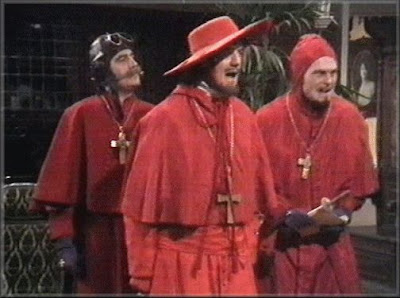Happy Labor Day! What have we here?
Classical music review: In opener, Fort Worth Symphony Orchestra shows why baroque festivals are rare
Lawson Taitte, Dallas Morning News, 10/27/2010
While the usual title-writing caveats apply, the titular assertion is just untrue. Utilizing the time-intensive, rigorous methodology known as Spending Five Fucking Seconds on A Google Search, I turned up this list.
Now, clearly, those are not all strictly baroque festivals, but the broader point made below about the Scary Jackbooted Demons of Historically Informed Performance Practice apply.
But I’m getting ahead of the argument.
Symphony orchestras are baffled by the baroque these days.
Are they now?
Specialists in historically informed performance have changed the rules about how to interpret music of the period.
Those academic fascists! Why would anyone even attempt to figure out how music three centuries old might have sounded back then? Why, they think they’re better than us [sic]!
 Figure 1: What the hell is that thing? I don't care what instrument it was written for. Just play it on something I can recognize, you elitist!
Figure 1: What the hell is that thing? I don't care what instrument it was written for. Just play it on something I can recognize, you elitist!Most regular orchestras have just given up.
Yes; you’re right. No one ever programs Bach or Vivaldi. Or Handel. Ever.
So give the Fort Worth Symphony Orchestra credit for bravery in scheduling a three-night baroque festival this weekend – 20 works by 15 composers, two of them anonymous.
Sure, I guess. Credit for you, FWSO! Way to play music written by dead white men! No one could have seen that coming.
I don’t know about bravery, though; if they do it wrong will the HIP Secret Police show up and disappear the entire string section?
Friday's opening revealed some of the issues that make such programs rarities.
Except for the part where I Googled up a bunch of early music festivals.
The Overture to Bach's Orchestral Suite No. 3 launched the festival with a performance that was accurate but lifeless.
Ah, actual music criticism! That tastes far better than speculation-slander.
In the three concertos followed, the orchestra seemed to have been coached merely to stay out of the soloists' way.
Memo
To: Dallas Morning News Editorial Department
From: Sator Arepo
Subject: Copy editing
Sirs and/or Ladies,
Your copy editor seems to have absconded. Please replace him at once. Thank you.
That's especially deadly in Vivaldi.
For reasons that are unclear, obvious enough to warrant an utter lack of elucidation, or shall remain arcane for mischievous reasons?
Kevin Hall played one of the Red Priest's 39 bassoon concertos with amazing suavity but little inflection.
Which would have been covered up if the orchestra had played better? Or so I infer.
Bach's Concerto for Two Violins fared better, though soloists Swang Lin and Alexandra Jennings Flanagan had different ideas about phrasing. (He favored greater articulation but a cloying vibrato; she dug in and got a darker, richer sound.)
That sounds like it might be cool, actually. It’s a fair critique, however, and merits mention in a music review, even if it does nothing to elaborate on the impending death sentences (presumably carried out by HIP Black Ops squads) that the orchestra and conductor have brought upon themselves.
After intermission, Jennifer Corning Lucio played the famous Alessandro Marcello Oboe Concerto with passion and finesse – easily the highlight of the concert.
(This is merely editorial, but that is one boring-ass piece.)
In the highly decorated slow movement, Lucio proved once and for all that stylistic outlook isn't nearly as important as having something to say about the music.
Demonstrated? Made a case for? Expressed? No? “[P]roved once and for all…”?
Well, I guess we won’t ever be hearing about that issue again. I’ll be sure to email all of the other music critics, performers, and conductors and let them know.
The orchestra only came into its own when both conductors, Miguel Harth-Bedoya and Andres Franco (who had subbed in the Bach Double), left the stage. The violinists stood as the orchestra played the Pachelbel Canon and Gigue without a front man.
Well, that's certain...wait.
What?
Did you attend a fucking wedding? Cripes. If I ever go to a baroque-themed orchestra concert and they play that stale, tired-ass piece, I’ll have to be forcibly restrained from committing ritual seppuku.
Harth-Bedoya returned for movements from Handel's Water Music.
A special treat! Because one never, ever, ever hears that programmed. Kudos once more to the brave folks at the FWSO for reaching deep into the baroque catalog and finding a hidden gem!
Here, at last, he seemed to care about the piece as he let the orchestra rip, with superb French horns and woodwinds.
The implication is that he didn’t care about the other baroque pieces because his enjoyment of programming and performing them has been stolen by the Mean Old Musicologists.
The Overture didn't quite capture the true Handelian swagger, but by the end the entire band was off its leash and sprinting toward the finish line.
...aaand close with a mixed metaphor. Cut! Print!


3 comments:
Well the biggest sin I see when symphony orchestras try to do baroque is that they use too many players. I can live with the modern instruments and the 440 tuning but mostly what you get is a cluttered, muddy sound.
Do a baroque piece properly and two thirds of the players need to be offstage. How is the management gonna be OK with that?
I just love reading your posts - they're so refreshing... in that oddly cynical kind of way :)
Socio - Heh; thanks.
Post a Comment